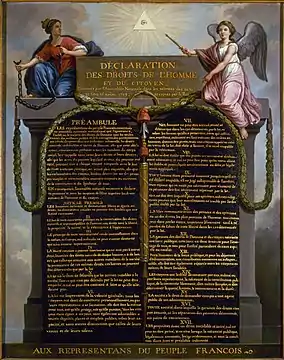Michel du Motier, Marquis de La Fayette
Michel Louis Christophe Roch Gilbert Motier, marquis de La Fayette[1] (13 August 1731 – 9 July 1759) was a colonel in the French Grenadiers.
Michel du Motier | |
|---|---|
| Marquis de La Fayette | |
| Born | Michel Louis Christophe Roch Gilbert Motier 13 August 1731 Kingdom of France |
| Died | 9 July 1759 (aged 27) Minden, Minden-Ravensberg, Prussia |
| Spouse(s) | Marie Louise Jolie de la Rivière
(m. 1754) |
| Issue | |
| Father | Eduoard du Motier, marquis de Vissac |
| Mother | Marie Catherine de Suat, dame de Chavaniac |
Early life
Michel Louis Christophe Roch Gilbert was the son of Eduoard Motier de La Fayette, the Lord of Champetières and Marquis de Vissac, and Marie Catherine de Suat, dame de Chavaniac.[2]
The marquis title and Lord of Chavaniac passed to him from his elder brother, Jacques-Roch du Motier (1711–1734), upon his death on January 18, 1734 while fighting the Austrians at Milan in the War of Polish Succession.[3]
Career
The Marquis de La Fayette was a colonel in the French Grenadiers and was a Knight of the Order of Saint Louis. During the Battle of Minden in the Seven Years' War, he was killed by a cannonball,[4] while fighting a British-led coalition in Westphalia.[5]
Personal life
.jpg.webp)
On 22 May 1754, he married Marie Louise Jolie de la Rivière (1737–1770), the daughter the Marquis de la Rivière a rich nobleman from Brittany. She was a descendant of Louis IX. and of Charlemagne. Her material grandfather was the Comte de La Rivière, until his death in 1770 commander of the Mousquetaires du Roi, or Black Musketeers, King Louis XV's personal horse guard.[6] Together, they were the parents of a son who was born at the château de Chavaniac, in Chavaniac-Lafayette, near Le Puy-en-Velay, in the province of Auvergne (now Haute-Loire).:[7][lower-alpha 1]
- Gilbert du Motier, Marquis de Lafayette (1757–1834), who played a significant role in the American and French Revolutions.[1]
The year he died, his son was only two years old,[8] who then became marquis and Lord of Chavaniac, but the estate went to his widow.[5] Perhaps devastated by the loss of her husband, she went to live in Paris with her father and grandfather,[6] leaving their son to be raised in Chavaniac-Lafayette by his paternal grandmother, Mme de Chavaniac, who had brought the château into the family with her dowry.[9] His widow and her father died in 1770, leaving Michel's twelve-year-old son orphaned.[4]
Notes
- His full name is rarely used; instead he is often referred to as the marquis de La Fayette or Lafayette (in the United States, not in France where a two words spelling is official). Biographer Louis R. Gottschalk says that Lafayette spelled his name both Lafayette and La Fayette. Other historians differ on the spelling of Lafayette's name: Lafayette, La Fayette, and LaFayette. Contemporaries often used "La Fayette", similar to his ancestor, the novelist Madame de La Fayette; however, his immediate family wrote Lafayette. See Gottschalk, pp. 153–54.
References
- "Marquis de Lafayette papers, 1757-1990". www.loc.gov. The Library of Congress. Retrieved 14 August 2018.
- "La Fayette généalogie". parbelle.free.fr. Retrieved 14 August 2018.
- Tower, Charlemagne (2005). The Marquis de la Fayette in the America. Cosimo, Inc. p. 5. ISBN 9781596051867. Retrieved 14 August 2018.
- "Biography of the Marquis de Lafayette". www.ushistory.org. Retrieved 14 August 2018.
- Gottschlk, pp. 3–5
- Unger, Library of Congress. 383
- Clary, pp. 7, 8
- Gottschalk, Louis R. (2007). Lafayette comes to America. Read Books. pp. 3–5. ISBN 978-1-4067-2793-7.
- Clary, pp. 11–13
